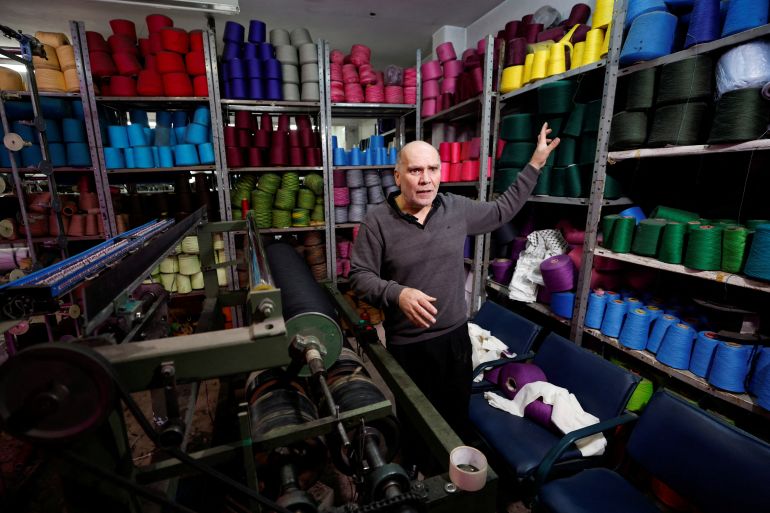An uptick in keffiyeh sales has emerged as a significant trend, indicating a surge in pro-Palestinian solidarity in the United States. Americans are increasingly donning the keffiyeh, a distinctive patterned scarf closely associated with Palestinians, to demand a ceasefire to Israel’s attacks on Gaza and to express their support for the Palestinian cause. Sales of these scarves have witnessed a considerable spike since the Israel-Hamas war began in October, according to US distributors. However, the rise in popularity of keffiyehs has not been without its challenges. Security forces at some protests have forcibly removed the scarves, and wearers have reported being targeted for verbal and physical abuse.
Azar Aghayev, the US distributor for Hirbawi, the sole manufacturer of keffiyehs left in the Israeli-occupied West Bank, described the sudden surge in demand as astonishing. Hirbawi, which holds the patent for its brand, sells scarves internationally through its US and German websites as well as on Amazon. Aghayev revealed that all 40 variations available on the US website, including vibrant colors alongside the traditional black and white, are sold out. Data from e-commerce analytics firm Jungle Scout showed a 75 percent increase in unit sales of keffiyeh scarves on Amazon.com between October 7 and December 2, compared to the previous 56 days. Additionally, searches for “Palestinian scarf for women” rose by 159 percent in the three months leading up to December 4, with searches for “military scarf shemagh,” “keffiyeh Palestine,” and “keffiyeh” increasing by 333 percent, 75 percent, and 68 percent, respectively.
The keffiyeh, recognized by its fishing net pattern, is a common accessory across the Arab world, with historical roots dating back to 3100 BC. It first became a symbol of Palestinian resistance during the 1936 Arab Revolt against British rule and later gained prominence as the signature headgear of Palestine Liberation Organization leader Yasser Arafat. While Hirbawi remains the most well-known manufacturer, there are also smaller artisans and global copycats. Luxury brand Louis Vuitton even released its own version of the keffiyeh in 2021.
Supporters of both Palestinians and Israel in the United States have faced threats and attacks since the conflict in the Middle East began. Jewish Americans have experienced an increase in anti-Semitism, while Muslim Americans have witnessed an uptick in Islamophobia. Hazami Barmada, a former United Nations official living in Virginia, recently wore a keffiyeh while protesting for a ceasefire in Gaza. She described the act as empowering, reconnecting her with her Palestinian heritage and symbolically linking her to the children in Gaza. However, she also acknowledged that wearing the keffiyeh attracts verbal abuse, stating that it is a “calculated risk.”
Instances of hostility towards keffiyeh wearers have been documented across the United States. At the Rockefeller Center Christmas tree lighting in New York City, a security guard forcibly removed a keffiyeh from an attendee, as captured in a Reuters photograph. The Council on American-Islamic Relations has recorded several cases where people wearing keffiyehs were targeted, including a father assaulted on a Brooklyn playground and a Harvard University graduate student who was verbally attacked for wearing a “terrorist” scarf. In the most severe incident, three college students of Palestinian descent, two of whom were wearing keffiyehs, were shot in Burlington, Vermont. One of the students is now paralyzed from the chest down. Authorities have charged a suspect with attempted murder and are investigating whether it was a hate-motivated crime. Tamara Tamimi, the mother of one of the students, expressed her belief that her son and his friends would not have been targeted if they had not been “dressed the way that they were and speaking Arabic.”
Amidst these challenges, the Students for Justice in Palestine (SJP), a prominent group in US campus activism since the Israel-Hamas conflict began, has been encouraging students to wear keffiyehs as a sign of solidarity with the students who were shot in Vermont. While some SJP members in Houston, Texas, have chosen to limit wearing their keffiyehs to spaces they consider safe for Arabs and Muslims, demand for the scarves remains strong. Morgan Totah, founder of Handmade Palestine, a group based in the Palestinian city of Ramallah that sells local artisans’ products online, stated that they would have sold even more keffiyehs if they had a larger stock.




